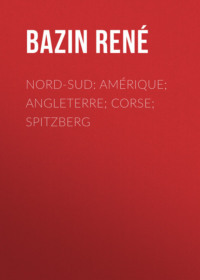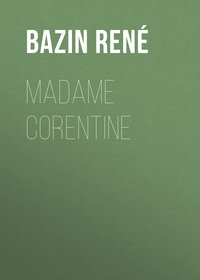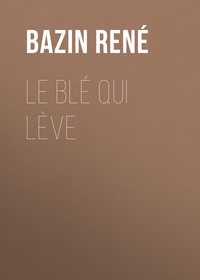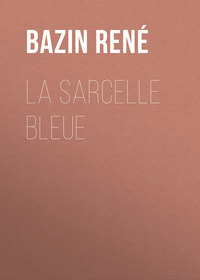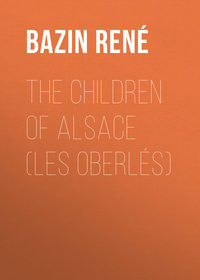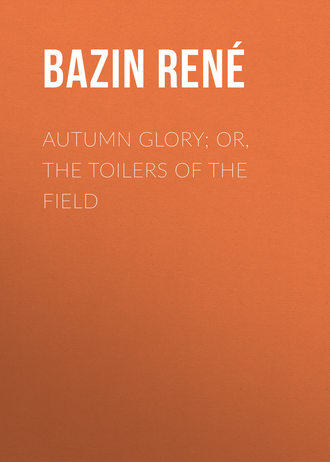 полная версия
полная версияAutumn Glory; Or, The Toilers of the Field
Tired after a night passed in the train, and in going from one agent's office to the other, a stranger and unknown, André was sitting on a bundle of sheep-skins in the docks of a great seaport, awaiting the hour of embarkation in a steamer that was to bear him away to the new country. In front of him the waters of the River Scheldt dashed up against the quay; emerging from the fog on one side they formed a kind of half circle, to be lost in deeper fog on the other, their broad expanse covered with shipping. André's weary eyes followed the moving panorama of sailing vessels, steamers, coasting and fishing boats all standing out grey in the fog and the fading light of day, now massed together, now disentangling and gliding away each to its own destination.
More often he looked beyond to the low-lying land round which the river curved, meadows half under water, deserted, immeasurable, seeming to float on the pale waters. How they reminded him of the province he had left! How they spoke to him! Neither the rolling of trucks, nor the whistle of commanding officers, nor the voices of the thousands of men of all nations unloading their ships round about him could draw away his thoughts. Nor did he feel any interest in the great city that extended behind him, and whence at times, amid the noise and bustle of the quay, came the sound of peals of bells such as he had never yet heard. But the time was drawing near. He knew this by the increasing agitation within him. The tramp of an approaching body of people made him turn his head; they were emigrants coming out of the sheds where they had been penned in by the agents, forming a long grey stream, seen through the mist. They come nearer, the foremost making their way through the casks and piles of sacks heaped upon the quay, and crossing the muddy gangway, hasten to secure the best places between decks; others follow, a confused mass of men, women, and children. Young and old are hard to distinguish; like tears, all look alike; all have the same sad look in their eyes; all are wearing their oldest clothes for the voyage: shapeless coats, jerseys, old mantles, kerchiefs over the women's heads, patched petticoats, odd garments in which they have worked and toiled many a day. They rub against André Lumineau, sitting on the bundle of skins, and pay no heed to him. They do not speak to one another, but in their hurried progress families form into distinct groups; mothers holding their children by the hand and shielding them from the wind, fathers with elbows extended protecting them from the pressure. All are carrying something: a bundle of clothing, a loaf of bread, a handbag tied together with string. All have made the same pause at the same place. As they turn in from the streets through the dock gates, they straighten themselves and stretch out their necks to look across, ever in the same direction, to the plains of the Scheldt, where a golden shimmer through the fog denotes the quarter of the setting sun; and, as though it were their own, they gaze upon a solitary little clock tower which rises out of the misty distance. Then they turn into the docks, find which is their boat, the steam already up, the windlass at work, the bridge black with emigrants. And their courage fails, they are afraid; many among them would fain turn back. But for them there is no turning back, they must embark, their tickets tremble in their shaking hands. In spirit only they return to the old country, to the poverty they have anathematized and now regret; to the deserted rooms, the suburbs, the factories, the country sides where once was "home." Pale and nerveless the living stream suffers itself to be swept on, and embarks.
For a long time André Lumineau looked on without joining the crowd. He was seeking a fellow-countryman. Seeing none, he at last put himself in line with the others; he was wearing his military cloak, the buttons of which had been changed, and was carrying the black portmanteau that five days ago reposed in the hayloft of Fromentière. His neighbours glanced at him with indifference, accepting him without remark.
Among them he crossed the quay, mounted the gangway, and stepped on board, the ship already swaying with the motion of the river. Then while others in the throng who had friends or relations with them were walking the decks in groups, or examining the machinery, or inspecting the cabins, he leaned over the side of the boat at the stern trying to distinguish the river and the grey meadow land, for memories were rushing thickly upon him, and his courage was nigh to deserting him. But doubtless the fog had deepened, for he saw nothing.
Beside him, hunched up upon the seat, was an old woman with still fresh complexion, wrapped in a black cloak with a cape to it, her coif fastened with a pair of gold pins, and rocking a child in her arms.
André took no notice of her. But she, unable to fix her eyes anywhere in the bustle and confusion of a ship on the point of departure, raised them every now and then to the stranger standing beside her, who so surely was thinking of the home he was leaving. Perhaps she had a son of the same age. The feeling of pity grew in her and albeit, well knowing that her neighbour would not understand her language, the old woman said:
"U heeft pyn."
After she had repeated it several times he understood by the word "pain" and the intonation with which it was said, that the woman asked, "You are in sorrow?" and answered:
"Yes, madame."
The old mother took Driot's hand in her soft shrivelled one, all cold and damp with the fog, and stroked it tenderly, and the young Vendéen broke down utterly and wept, thinking of bygone caresses from his old mother, who, too, had worn a white coif and gold pins on grand occasions.
Mist and fog were sweeping over the Marais of La Vendée, as over the plains of the Scheldt, driven by gusts of wind.
At times an expression of anguish crossed the face of Toussaint Lumineau as he followed with his eyes the quivering points of the osiers Rousille held out to him, as though they had been the masts of ships labouring in the ocean. At other times he would look long and lingeringly at his one remaining child, and Rousille knew that she was fair to look upon. A violent squall struck the elm-trees, stripping them clear of leaves, and beating their branches against the roof of La Fromentière. The rainspouts, the tiles, the rafters and walls, the very lizards in the barn groaned and creaked together – and the storm-cry groaned, wildly and madly, over the Marais.
Three hundred leagues away the melancholy whistle of a sirene awoke the echoes, the screw of a huge steamer parted the waters of the river and drew away slowly from shore, as though yet half inert and drifting. No sooner did the emigrants, outcasts of the old world, poor and hopelessly miserable, feel themselves afloat, than they were terrified. The thoughts of all on board flew back to their deserted homes. It was in the darkness of night that André Lumineau went forth.
The farmer threw back a handful of osiers into the vat, saying:
"Let us go in. My old hands can work no longer."
But he did not stir. The man, alone, ceased chopping the poles of chestnut wood, and left the barn. Rousille, seeing that her father made no movement to rise, stayed where she was.
CHAPTER XVI.
HER FATHER'S BIDDING
Evening had come, the evening of a February day, which casts its shadow so soon. Through the door of the barn came only a deceptive gleam, like that of a smouldering cinder, blotting out all form. Toussaint Lumineau's arms had sunk on either side of his body; still sitting on the joist, his face uplifted in the dusk, he waited till the man should have crossed the yard. When he had seen the door of the house-place, where Mathurin was watching, open and shut, he lowered his eyes to his daughter.
"Rousille," he said, "are you still of the same mind concerning Jean Nesmy?"
The girl, kneeling on the ground, her profile indistinct in the darkness, slowly raised her head and stooped forward as though better to see him who spoke in so unexpected a manner. But she had nothing to conceal, she was not one of those who are timid and fearful; she only quieted her beating heart, which could have cried aloud with joy, and said, with apparent calm:
"Always, father. I have given him my love, and shall never withdraw it. Now that André is gone, I quite understand that I cannot leave you to go and live in the Bocage. But I shall never marry; I will stay with you and serve you."
"Then you will not forsake me as they have done?"
"No, father, never."
Her father rested his hand upon her shoulder, and the girl felt herself enveloped in a tenderness hitherto unknown. A hymn of thanksgiving passed from soul to soul. Around them the wind and rain were raging.
"Rousille," resumed the farmer, "I have no longer a son to lean upon. André was the last to betray me. François has refused to come back. And yet La Fromentière must continue ours."
A firm, sweet voice answered:
"It must."
"Then, little one," continued her father, "your wedding bells must ring!"
Rousille dared not understand. Still on her knees she drew a little closer so as to touch her father. She longed that daylight would come back to reveal the expression of the eyes fixed upon her. But the darkness was impenetrable.
"I had always hoped," continued the farmer, "that there would be one of my name to carry on the farm after me. God has refused me my desire. As for you, Rousille, I should have liked to have given you to a Maraîchin like ourselves; one in like position, and from our part. Perhaps it was pride. Things have not turned out according to my wishes. Do you think that Jean Nesmy will consent to come back to La Fromentière?"
"I am certain of it! I can answer for him. He will come back!"
"And his mother will not seek to offer us any affront?"
"No, no. She loves her son too well for that; she knows everything. But Mathurin!" and she stretched out her arm towards the house lying hidden in the darkness. "Mathurin would not have it. He hates us! He would make life so hard for us that we could not stay here."
"But I am still here, dear child, and I mean to gather the three of you about me."
Had Rousille heard aright? Had her father really in so many words given his consent to her marriage? Yes, for he was now standing upright, and in rising he had raised his daughter, and was holding her in close embrace, his tears falling so fast that he could not speak. But contact with her youthful happiness seemed to have lent him fresh courage.
"Do not fear Mathurin," he said, "I will reason with him, and he must obey. It was I who dismissed Jean Nesmy; it is now my will that he comes back to be my son and helper, and the master here when I am gone."
The girl listened in the darkness.
"It is my wish that he should come back as quickly as possible, for a place does not prosper in hired hands however good they may be. I have thought it all out for you, Rousille. You will go from here where we now are, straight to the Michelonnes."
"Yes, father."
"That will give me the time to speak to your brother. You will therefore go to them and say: 'My father cannot leave La Fromentière and Mathurin, who has not been well these last few days. He asks you to go for him to the Bocage, and to beg the mother of Jean Nesmy to let her son come back to be my husband. The sooner you start the better for us.'"
Now Rousille's tears were falling fast. Toussaint Lumineau continued:
"Go, my Rousille. Greet the Michelonnes from me … tell them it is to save La Fromentière."
A whisper answered:
"Yes," and a pair of young arms were thrown round the old farmer's neck, and his face drawn down for a long, loving kiss. Then, going a little away from him, across the darkness through which they could not see each other, Rousille said: "I am happy, father. I will go at once to the Michelonnes … but, oh! how much better it would have been if we could have had all our people at my wedding!"
And she ran out into the night. Her father stood for a moment, proud and happy. She had said "our people," this little Rousille; she spoke like her ancestresses who had ruled in La Fromentière. She was a true descendant of the great-grandmothers she had never known, thorough housewives, who from the very day they were brought home as wives, staid and happy, seemed to bring with them as reading in an ever open book the sense of family cares and joys.
Rousille ran along the road, unheeding the stoniness of the way. Rain fell heavily, but she did not feel it. Sometimes she pressed her hand to her heart, to calm its beating. She thought, "I am happy," and with that she wept.
The windows of all the houses in Sallertaine were lighted when she reached the long street. The timid sisters Michelonne had already shut their shutters, and drawn their bolts.
"Aunts Michelonne!" she cried, knocking with her hand on the door, "please let me in quickly."
It was the work of a moment for Véronique to draw the bolt, open the door, and shut it behind the new-comer.
"How wet you are, Rousille!" she exclaimed, "and without cloak or kerchief in such weather! It has struck seven. What brings you out at such an hour?"
At the far end of the room, on a chest beside the bed nearest to the fireplace, Adelaide had stood the solitary tallow candle, its long smoky wick burnt to a thick glowing knob. By its dim light she was beginning to undress, and had already taken off her apron. A corner of the sheet turned back upon the coverlet showed a patch of whiteness; the rest of the shop was in gloom – chairs, spinning wheels, the table, the other bedstead, and the clock beside it calmly ticking.
"Do not let me disturb you, Aunt Adelaide," said the girl going towards her; "I have news."
The eldest of the sisters taking the candlestick, held it up to Rousille's face, and seeing traces of tears upon it, said:
"Sad news, again, dear child?"
"No, aunts, glad news."
"Then let us sit down, and tell it quickly."
The old sisters sat on the oak chest and made Rousille take a chair facing them, close up that they might see her happy face, and each taking a hand in hers prepared to listen. The three faces were close together; the candle gave just light enough to reveal lip or eyes irradiated with a smile.
"My news is," said Rousille, "that my father, having no longer a son to help him, wishes Jean Nesmy to come back."
"What, Rousille, your sweetheart?"
"Aunt Michelonne, it is to save La Fromentière."
"Then you are going to be married, pet; you are going to be married?" exclaimed Aunt Adelaide enthusiastically, half rising; while her sister, on the contrary, bent lower to hide her emotion.
"Yes, father has said so. If you will help me."
"If! You know I will; you are my daughter. You have only to ask for what you want – but tell me, is it money?"
"No, aunt."
"A trousseau that we will both set about making?"
"Something far more difficult," said Rousille. "To make a journey – a long one."
"I, a journey?"
"You, or Aunt Véronique. As far as the Bocage. Father cannot leave home; you are to go in his stead to see Jean Nesmy's mother, and persuade her to let her son come away. Will you do it?"
Véronique sat upright. "You go to the Bocage, Adelaide, you are more active than I am."
"Is that any reason? So great a pleasure; to do Rousille so great a service, why should you not have the privilege?"
"Sister, you are the elder; you take the place of the mother."
"You are right," said Adelaide simply.
She was silent for a short time; in the agitation of the news and her decision, the pretty pink cheeks had paled. Then she said:
"You see, it is forty years since I have been beyond the town of Chalons. I never thought to make any journey again. Where is Jean Nesmy's country?"
With a pretty smile on her face at the recollections it evoked, Rousille touched Aunt Michelonne's black dress three times with the tip of her finger.
"Here," she said, "is the farm of Nouzillac, where he is employed; there, a parish called La Flocellière; and there Les Châtelliers, where is his house, called La Château."
"I do not know any of those names, pet."
"There are hills in all directions, some small, some large, and a great many trees. When the wind blows from Saint Michel it rains without ceasing. Pouzanges is not far."
"I have heard speak of Saint Michel and Pouzanges when I was quite a child by Boquins, who used in those days to come to our part to seek for fuel. And when must I go?"
Lowering her soft eyes, Rousille answered:
"Father is hard pressed. He said the sooner the better."
"Holy Virgin! But I cannot start to-night. Still, look at the clock, Véronique, your eyes are better than mine."
The younger sister rising, trotted to the foot of the tall clock which stood between the beds, and with difficulty read the time from the copper-clock face.
"Too late, sister. The last tramway for Chalons has just passed."
"Then," said Adelaide, "I will start to-morrow morning. I have good legs to carry me to Quatre-Moulins, and a good tongue to ask my way later from the shopkeepers at Chalons. I will go. All the way I shall be thinking of you, Rousille, and when I see La Mère Nesmy – you will say I am conceited – but I shall not be a bit embarrassed, I will tell her of you, and I shall have plenty to tell. Why are you getting up, little one?"
"To go home, Aunt Michelonne."
The two old sisters laughing, cried simultaneously:
"No, that you are not indeed! You have told us nothing. What did your father say when he gave you permission? And what about François? And what does Mathurin think of it all? Stay, dearie, and tell us all about everything; and what is to be the message for Jean Nesmy?"
As when night falls over the fields partridges cluster together in a furrow, feather to feather, so the three women again grouped themselves, in close vicinity, in the corner of the shop. Words, looks, smiles, gestures, sometimes tears, all that bespeaks deep feeling, found utterance, and was re-echoed by the two auditors. A joyous murmur floated through the dwelling of the two old maids. Adelaide was slightly fevered; Véronique, without wishing to confess it, was already nervous at the idea of being left alone. Time went on. The neighbours, as they extinguished their lamps said: "Mademoiselles Michelonne are sitting up late to-night! Work seems plentiful in their trade!"
The town was sunk in darkness and silence under an icy rain when Rousille left her aunt's doorstep. On both sides the same words served for their parting. Adelaide said it first; Rousille repeated it. In one case it was a promise; in the other an expression of thanks.
"To-morrow morning!"
"To-morrow morning!"
CHAPTER XVII.
A FEBRUARY NIGHT
When Rousille had crossed the courtyard and taken the road to Sallertaine, the farmer, having taken the pot off the fire, left the barn. He found the man sitting in the chimney-corner, pushing together the half-dead twigs that had fallen from the fire-dogs with the points of his sabots. At the far end of the room, Mathurin was moving restlessly about on his crutches, with crimsoned face, utterly unable to keep his nerves under control. He did not speak to his father, did not appear to have heard him enter. But after a minute, as the farmer, bending down, was speaking in a low voice to the man, he exclaimed violently:
"And Rousille, what had you to say to her that kept you so long in the barn?"
Before replying, Toussaint Lumineau followed with his eyes the movements of the unhappy young man, a prey to a species of madness produced by rage and pain, such as was too well known at La Fromentière – since André's departure the paroxysms had become more frequent – and the father was moved to pity. Ignoring the insolence of the question, he said simply:
"Your sister will come back later, Mathurin. Where she has gone I have sent her."
"I am not to know where she is, then?" cried the cripple still more violently. "Everything is hidden from me here, and she is told all!"
At a sign from the farmer the man took out a couple of potatoes with his knife from the saucepan, slipped them into his coat pocket, cut a slice of bread from the loaf on the table, and carrying off his supper, went out into the yard.
The father and son were alone. Toussaint Lumineau, standing erect in the firelight, said:
"On the contrary, you are going to know all, Mathurin. Your brother François refuses to come home to us."
"I thought so."
The cripple had drawn back into a dark corner between the two beds, out of the range of the lamplight; there, as though on the watch for the words spoken, he listened; his trembling hands resting on the crutches shook the bed-curtains.
"La Fromentière cannot go on as it is now," resumed the farmer. "I have bidden Rousille take a message to the Michelonnes. One or the other of the sisters, whether it be Adelaide or Véronique matters not, is to go to the Bocage to bring back Jean Nesmy."
"Ah! you are marrying Rousille?"
"Yes, my friend."
"To a dismissed farm-servant!"
"I am taking him back."
"A Boquin! A man not of these parts!"
"A good worker, Mathurin, and one who always loved our soil."
"And he is to live at La Fromentière?"
"Of course. I need help. I need a son to stand by me."
Mathurin's tawny head was thrust out from darkness.
"And me," he cried, "what are you going to do with me?"
In his look was a concentrated reproach, all pent-up suffering and wrath of years.
"So I, the eldest, the rightful heir, am only to bear my suffering and submit to the will of others?"
"My son," replied his father gently, "you will continue to live with us as now; you will do what you can, and no one will expect more. No work will be undertaken here without your having first been consulted, that I promise you. The farmstead will be your home after my death as now."
"No. I will not be ordered about by a man who does not bear my name. A Lumineau, and a Lumineau only, must be master here!"
"It is the sorrow of my life, Mathurin, that this cannot be."
"I could have borne with François, even with André," continued the cripple, with equal vehemence, "but Rousille and her Boquin shall never be the masters here. It is my home, and, I tell you, it is my turn!"
"But, my poor boy, you cannot take the management."
The serge curtains shook, and the unhappy man, suffocating with rage, made a few uncertain steps forward.
"I cannot tell what is good ploughing?" he gasped.
"Yes."
"I cannot buy a pair of oxen?"
"Yes."
"I cannot have myself drawn about in a cart, or punt a boat? Answer, if you please."
"Yes, my son."
"Then what further do I need for the management of a farm? Labourers I can hire. A wife?"
His father dared not say Yes.
"I will bring one!" Mathurin had reached the corner of the table and was now leaning upon it, the upper part of his body swaying and struggling to maintain its equilibrium. "One who has more heart than all of you put together! She knows that I shall get well. She has almost given me her promise to marry me as I am … when I shall have persuaded her."
"Do not trust to what the girls tell you, my poor lad. It is only fathers and mothers who love and cherish those afflicted as you are… You are ill this evening. See, your limbs are failing you. Come to bed, I will help you."
The cripple did not try to answer. His eyes closed, his head sank on to his shoulder; the crutches slipped from under the arms that stretched out as those of a drowning man seeking help. He would have fallen to the ground had not the farmer rushed forward to support him.
The giddiness did not last long. It was a sharp but short attack. Hardly had his father got him into a recumbent position on the chest at the foot his bed than Mathurin opened his eyes. He looked at his father, raised himself unaided, and putting hand to the back of his neck, said:
"You see, it is nothing. The pain you caused did it… I am not ill."
All trace of anger had disappeared, but the misery in his face was the same, mingled with that kind of horror men experience when they have been at the very verge of death.




